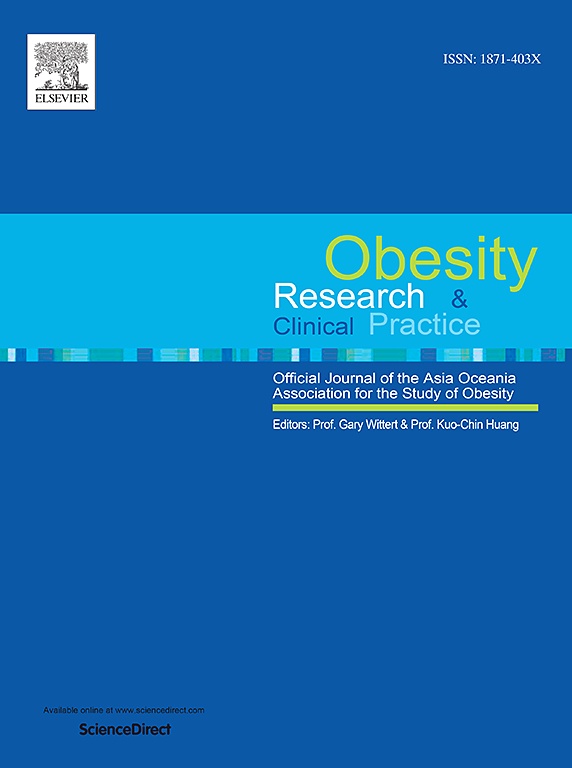Bariatric surgeons’ views on barriers and enablers to bariatric surgery in Australia and New Zealand: A qualitative content analysis
IF 2.5
4区 医学
Q3 ENDOCRINOLOGY & METABOLISM
引用次数: 0
Abstract
Problem and Aims
Bariatric surgery can be an effective treatment for severe obesity, yet publicly-funded access is often limited. Bariatric surgeons contribute to decisions regarding consumer (non)progression to bariatric surgery. Still, little is known about their views on barriers and enablers to bariatric surgery in the Australian and New Zealand context. The current study addresses this knowledge gap.
Methods
A qualitative design was utilised. Sixteen bariatric surgeons and registrars from Australia and New Zealand were interviewed about their views on barriers and enablers to bariatric surgery. The data were analysed using qualitative content analysis.
Results
Five content categories were derived from the analysis: 1. patient-related factors; 2. healthcare experiences and clinician-related factors; 3. societal beliefs and attitudes towards obesity, bariatric surgery and bariatric surgeons; 4. economic, governmental and institutional factors; and 5. bariatric surgery in the context of other treatments. A perceived lack of focus on obesity and publicly-funded bariatric surgery was apparent throughout the data in the form of descriptions of stigma, clinicians’ disillusionment, patients not being guided and supported, and inadequate regulation and organisation of the field. The role of patients in determining their surgical progression was emphasised.
Conclusions
Participants discussed numerous barriers but fewer facilitators to bariatric surgery in Australia and New Zealand. Some of their opinions merit exploration with other bariatric multi-disciplinary team members and patients to understand further how the pre-operative process might be enhanced to support patients’ needs and improve equity.
减肥外科医生对澳大利亚和新西兰减肥手术的障碍和促进因素的看法:定性内容分析。
问题和目标:减肥手术是治疗严重肥胖的有效方法,但公共资助的机会往往有限。减肥外科医生有助于决定消费者(非)进展到减肥手术。然而,在澳大利亚和新西兰的背景下,他们对减肥手术的障碍和促进因素的看法知之甚少。目前的研究解决了这一知识差距。方法:采用定性设计。来自澳大利亚和新西兰的16位减肥外科医生和登记员接受了采访,询问了他们对减肥手术障碍和促进因素的看法。采用定性内容分析法对数据进行分析。结果:通过分析得出5个内容类别:危险因子;2. 医疗保健经历和临床医生相关因素;3. 社会对肥胖、减肥手术和减肥外科医生的信念和态度;4. 经济、政府和制度因素;和5。在其他治疗方法的背景下进行减肥手术。在整个数据中,明显缺乏对肥胖和公共资助的减肥手术的关注,其形式是对耻辱的描述,临床医生的幻灭,患者没有得到指导和支持,以及该领域的监管和组织不足。强调了患者在决定手术进展中的作用。结论:参与者讨论了在澳大利亚和新西兰进行减肥手术的许多障碍,但促进因素较少。他们的一些观点值得与其他肥胖多学科团队成员和患者一起探讨,以进一步了解如何加强术前流程,以支持患者的需求并提高公平性。
本文章由计算机程序翻译,如有差异,请以英文原文为准。
求助全文
约1分钟内获得全文
求助全文
来源期刊

Obesity research & clinical practice
医学-内分泌学与代谢
CiteScore
7.10
自引率
0.00%
发文量
80
审稿时长
49 days
期刊介绍:
The aim of Obesity Research & Clinical Practice (ORCP) is to publish high quality clinical and basic research relating to the epidemiology, mechanism, complications and treatment of obesity and the complication of obesity. Studies relating to the Asia Oceania region are particularly welcome, given the increasing burden of obesity in Asia Pacific, compounded by specific regional population-based and genetic issues, and the devastating personal and economic consequences. The journal aims to expose health care practitioners, clinical researchers, basic scientists, epidemiologists, and public health officials in the region to all areas of obesity research and practice. In addition to original research the ORCP publishes reviews, patient reports, short communications, and letters to the editor (including comments on published papers). The proceedings and abstracts of the Annual Meeting of the Asia Oceania Association for the Study of Obesity is published as a supplement each year.
 求助内容:
求助内容: 应助结果提醒方式:
应助结果提醒方式:


